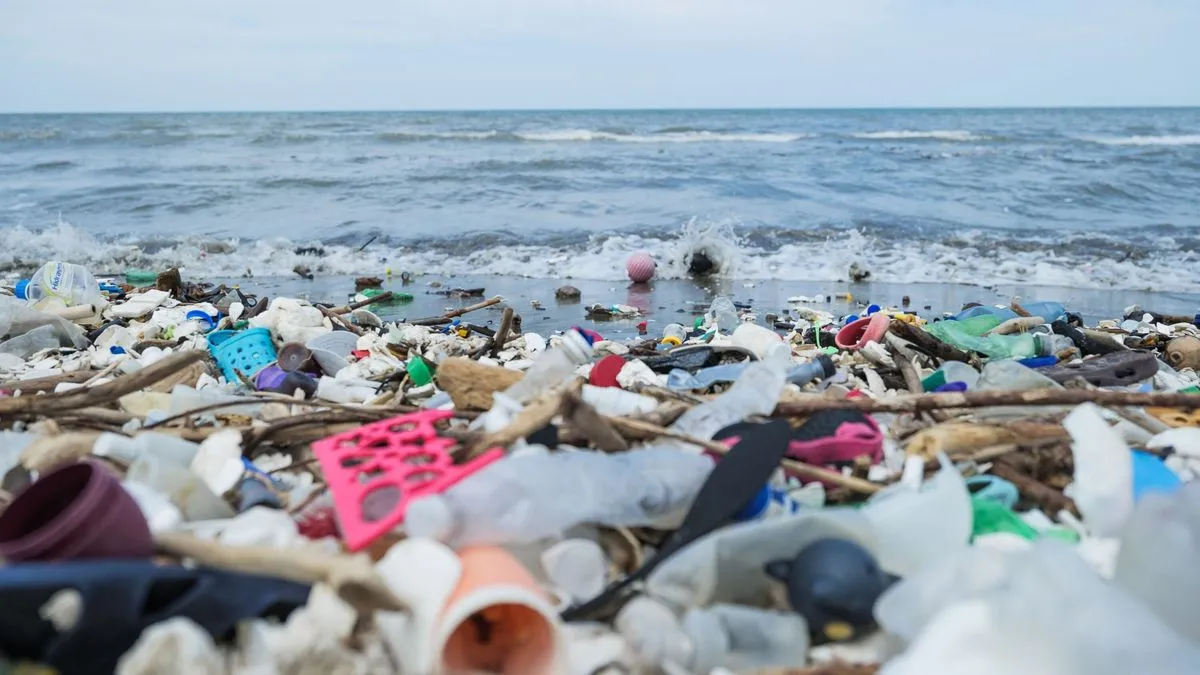Saving the Oceans: Strategies for Tackling Plastic Pollution

One of the most critical global problems currently is the issue of plastic pollution in our oceans. Millions of tons of plastic waste that are dumped into the ocean each year are destroying marine life and damaging entire ecosystems. However, there is still a way out.
This article will familiarize you with effective strategies to address this issue and save our oceans from plastic pollution. Indeed, there have already been many ways – from new recycling methods to the promotion of ecologically safe alternatives – which can have the desired effect. We will consider various points – from the need to use fewer single-use plastic goods to stringent regulations on plastic wastes.
We will also outline the importance of broadcasting to the population information campaigns about what is happening. By realizing the seriousness of the threat and the very real solutions to this situation, we can begin the steps towards a cleaner, more excellent ocean ecosystem. Our article will tell you about the strategies that will help save our oceans and the life they contain. Join us and save our oceans from their dependence on plastic!

The Impact of Plastic Pollution on Oceans
Plastic pollution leads to dire consequences for the oceans and all kinds of fragile ecosystems. The ocean receives such a large amount of plastic waste annually, and it is too much for the inhabitants of all sorts. Sea turtles, dolphins, and even whales mistake plastic debris for a possible source of food so that they might eat it and get choked, injured, or starved to death. Moreover, plastic debris would entangle marine animals, preventing them from moving, breeding, or hunting.
The damage of the plastic pollution amounts to more than just the appearance of dead broods of marine animals. Namely, it would cause the growth of microplastics, which have seeped into the marine food chain altogether. Smaller types of marine life would consume the fragments, and then larger fish will eat them and end at our dining tables. While the long-term health outcomes of eating microplastics are unclear, it might not be very profitable for one’s health. Therefore, it is important to address the source of plastic waste in order to save the oceans.
Understanding the Sources of Plastic Pollution
Plastic pollution in the oceans has different sources. One of the primary ones is single-use plastics; the most common are plastic bags, straws, and bottles. Most of them are used for several minutes but stay in the environment for hundreds of years. The lack of proper disposal options and poor waste management systems aggravate the situation.
Another main source is the fishing industry with ghost nets; even after they are thrown away, they continue to catch marine animals. This type of discarded plastic is especially dangerous for marine life and the ocean ecosystem . The third source of plastic pollution is land-based sources, such as rivers and stormwater runoffs. These are types of plastic waste from industrial activities and cities that reach the ocean through rivers. Understanding the sources is important to find appropriate solutions to the problem.
Current Efforts to Combat Plastic Pollution
Fortunately, there are already ongoing efforts to address the plastic pollution crisis. Many organizations and individuals are dedicated to cleaning up beaches, organizing ocean cleanup events, and raising awareness about the issue. Governments and businesses have also started taking action by implementing bans on single-use plastics and supporting recycling initiatives.
In addition, innovative technologies are being developed to remove plastic waste from oceans. These include specially designed vessels that skim the surface of the water, collecting plastic debris, and floating barriers that trap plastic waste in rivers before it reaches the ocean. These efforts aim to prevent plastic pollution at its source and minimize the impact on marine ecosystems.
However, more comprehensive and coordinated actions are needed to effectively tackle the scale of plastic pollution in our oceans. It requires a multi-faceted approach that involves individuals, businesses, governments, and international collaborations.
The Role of Individuals in Reducing Plastic Waste
While the problem of plastic waste is complex and will require large-scale solutions to mitigate, everyone can take actions to reduce their personal contribution to the issue. This only requires small adjustments to everyday habits. By making the shift from single-use to reusable items such as cloth bags, water bottles, and metal straws, one can drastically decrease the demand for plastic production. Moreover, by making sure the used plastics are disposed of correctly and recycled when possible, it is likely to avoid plastics’ entry into the ocean.
Furthermore, the necessary education and raising awareness are widely available and can be drastically increased in the most accessible ways, e.g. through social media. By understanding and sharing the consequences of plastic pollution, everyone can contribute to a snowball effect, bringing the necessary changes to all sectors of society. Therefore, everyone must educate themselves and those around them about the impact of their actions and the available alternatives. Thus, small individual actions can have a meaningful positive impact on the state and development of oceans’ health.
Strategies for Businesses to Reduce Plastic Usage
Businesses also play a vital role in reducing plastic pollution. By adopting sustainable practices and embracing alternatives to single-use plastics, they can drive positive change. Implementing policies to minimize plastic packaging, offering refillable options, and incentivizing customers to bring their own containers are effective strategies.
Furthermore, businesses can collaborate with suppliers to find eco-friendly alternatives to plastic materials. From biodegradable packaging to plant-based materials, there are innovative solutions available that have a lower environmental impact. By prioritizing sustainable practices and investing in research and development, businesses can lead the way in reducing plastic usage and inspiring others to follow suit.
Government Policies and Regulations to Tackle Plastic Pollution
To address the plastic pollution crisis effectively, governments worldwide must take decisive action. Implementing policies and regulations that restrict the production and use of single-use plastics can significantly reduce plastic waste. Banning or taxing single-use plastic items, such as bags and straws, can encourage businesses and individuals to seek sustainable alternatives.
Additionally, governments can invest in improving waste management infrastructure and recycling facilities. By creating efficient systems for collecting, sorting, and processing plastic waste, they can ensure that it is properly disposed of or recycled. Governments can also enforce stricter penalties for illegal dumping and establish monitoring systems to track the progress in reducing plastic pollution.
International cooperation is crucial in addressing plastic pollution, as the oceans connect all nations. Governments can work together to establish global agreements to regulate and reduce plastic waste. By joining forces, countries can share best practices, collaborate on research, and develop unified strategies to protect our oceans from the devastating effects of plastic pollution.
Innovative Technologies for Plastic Waste Management
Fortunately, current technological advancement also presupposes hopeful prospective solutions to manage plastic waste. Engineered and researched develop new ways and ways of recycling and usage of the produced plastics. Technologies may range from chemical recourses breaking plastics into its components for further usage to 3D manufacturing with the use of plastic waste. Moreover, new methods and technologies tend not to be limited to post-consumer recycling.
Some emphasize avoiding plastics entering the oceans. Thus, solar-powered traps are launched in various rivers to capture floating plastics from entering the ocean. Other recourses are aimed at innovative filtrations of microplastics from wastewater discharged from households, industries, and more. Thus, it is clear that investments in research and development give hope for a sustainable future. Hence, the role played by numerous technological advancements cannot be underestimated to find sustainable ways of managing plastics and prevent them from polluting the oceans.

Collaboration and Partnerships for Ocean Conservation
Addressing the plastic pollution crisis requires collaboration and partnerships between various stakeholders. Governments, businesses, non-profit organizations, and individuals must work together towards a common goal of ocean conservation. By sharing resources, knowledge, and expertise, we can amplify our efforts and achieve greater impact.
Collaborative initiatives can include joint research projects, funding for cleanup efforts, and the development of sustainable practices. Businesses can form partnerships with non-profit organizations to support their conservation initiatives and promote sustainable alternatives. Governments can collaborate with international organizations to establish global guidelines and standards for plastic waste management.
By fostering collaboration and partnerships, we can create a united front against plastic pollution and save our oceans for future generations with wdbos.
Education and Awareness Campaigns on Plastic Pollution
Education and awareness campaigns are essential for inspiring behavioral change and raising public consciousness about plastic pollution. These campaigns can be conducted through various mediums, such as social media, television, and schools. They should focus on highlighting the consequences of plastic pollution, showcasing success stories, and providing practical tips for reducing plastic waste.
Engaging with local communities and schools is particularly important. By incorporating environmental education into the curriculum and organizing cleanup events, we can instill a sense of responsibility and stewardship towards the oceans. Empowering the younger generation with knowledge and the tools to make sustainable choices will create lasting change.
Furthermore, involving celebrities, influencers, and public figures in awareness campaigns can help reach a wider audience and amplify the message. By leveraging their platforms, we can generate more significant awareness and inspire individuals to take action against plastic pollution.
Working Together to Save Our Oceans
The issue of plastic pollution in our oceans demands immediate action. By understanding the impact of plastic pollution, identifying its sources, and implementing effective strategies, we can make a real difference in preserving our oceans and the diverse life they harbor.
From reducing single-use plastics and implementing strict regulations to developing innovative technologies and fostering collaboration, there are numerous approaches that can contribute to tackling plastic pollution. Individuals, businesses, governments, and international partnerships must work together, united by a shared commitment to ocean conservation.
Saving our oceans from the grip of plastic pollution requires a collective effort. By taking action today, we can pave the way for a cleaner and healthier future, where the oceans thrive and the beauty and biodiversity they hold can be enjoyed by generations to come.
Also read: Intel Core i9-14900K: Unleashing the Most Powerful PC Processor Ever




Leave a Comment